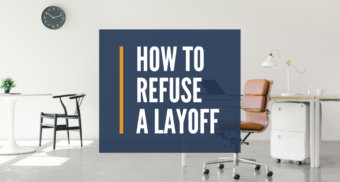Common questions and answers about Omicron and employment issues

Can I be fired due to the impact of the Omicron COVID-19 variant?
Your employer can always terminate your employment without cause as long as the termination does not violate applicable human rights legislation and they provide you with severance. There is no way to pre-empt or prevent a termination.
No reason needs to be provided to support a without cause termination, so it is possible that the impact of the variant is a reason for the decision, but the employer does not need to confirm this in their discussions with you.
A without cause termination becomes “wrongful” when your employer fails to comply with the law in regards to entitlements such as notice and severance. They are legally required to provide you with this compensation; if your employer fails to do so, you should speak to a lawyer at Samfiru Tumarkin LLP as you may have grounds to commence legal action.
Can my employer force me back to the office during the surge of the Omicron variant?
As long as your employer is complying with health guidelines and has required safety protocols in place, they can require that you attend the workplace despite the surge.
What are my employer’s obligations?
Your employer is legally obligated to provide a safe workplace. This means your employer has to ensure it is in compliance with all health and safety legislation including the applicable Occupational Health and Safety Act, and in the context of COVID-19, any government mandates, guidelines, and/or orders. In most cases, this will include things like requiring Personal Protective Equipment to be used as directed, enforcing social distancing and hand-washing, implementing a COVID-19 policy which may include vaccine and/or testing rules, and dealing swiftly and appropriately with any outbreaks.
If I don’t return to the office, could it be job abandonment or considered a resignation?
The answer to this depends largely on your conduct and the nature of your employment.
If you simply refuse to show up to work without having discussions with your employer, it is possible that after some time, your absence could constitute job abandonment. This is especially true if you refuse to communicate with your employer at all during this period, and they are left without any indication of your intention to return to work either now or in the future.
Your employer cannot assume you have resigned from your employment. You must provide your resignation expressly and without reservation. While not technically required, it is best practice for your employer to confirm your intention to resign in writing. Unless you expressly confirm your intention to resign, your employer will not be able to support any allegation that you have resigned.
LEARN MORE
• Do I get severance if I quit?
That being said, if you have concerns about returning to work and had been able to work from home previously without issue, then you should ask your employer whether you can continue until the number of cases is no longer climbing.
Even if you are not able to work from home, many employers are willing to work cooperatively with their employees (within reason and where possible) in order to resolve any concerns or issues relating to returning to the office. It is up to you as the employee to raise your concerns and propose reasonable solutions. Your employer will then consider whether it is possible to take those steps, or others, in order to help you feel safer about the return to work.
Any policies implemented by the employer will apply to everyone, but usually, this does not mean they cannot be adjusted on an individual basis. You should remember that you cannot assume your employer knows about your personal circumstances (such as living with a vulnerable person) and that your employer cannot possibly address your concerns unless you raise them. It is up to you to make your employer aware of these anxieties so that they have an opportunity to address them if possible.
If your cause for concern falls under the protection of applicable human rights legislation (ex. family obligations, caregiving, disability), your employer would be obligated to accommodate you. Even where human rights legislation doesn’t apply and accommodation is not required, many employers will still try to work with you and to take steps to find a resolution that helps alleviate your stressors to the extent possible assuming their business needs are still being met.




